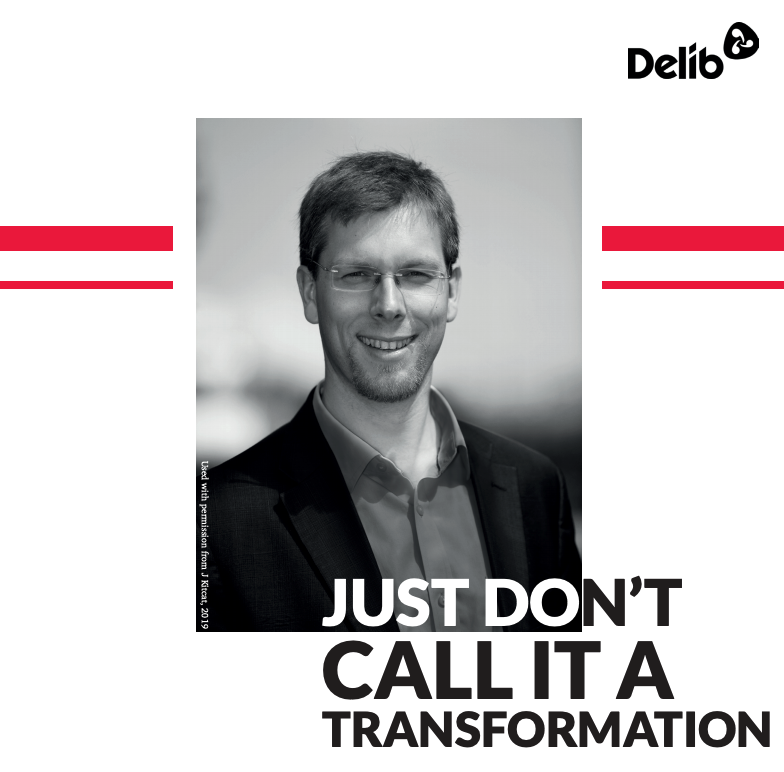Jason Kitcat took on the daunting task of modernising a local authority. Here’s how he did it.
Jason Kitcat spent two years as Executive Director for Corporate Development at Essex County Council. I interviewed him shortly before his role came to a close. Over the course of his time there, he did work that would radically change the way Essex County Council operated, preparing it for the age of the internet and beyond.
I’m not 100% sure what Jason’s title actually means, but somehow I don’t think it matters much. He has a vision, and is very much getting on with making it happen, whatever his title. He talks at a hundred miles an hour, in a fascinating mix of metaphors, allegories, and buzzwords, giving me not just the answer to my questions but to all the follow-up questions I was thinking of asking before I could ask them. I’m glad I recorded the conversation rather than attempting written notes.
I get off to a good start, asking him to talk me through the digital transformation strategy at Essex CC. “Well, we don’t have a digital transformation strategy. We don’t use the word digital, we don’t use the word transformation,” he replies. (Excellent work on my part.) “But other than that – what we do have is a view that internet-age tools, products, packages, and business models have a fundamental impact on the way we need to operate to stay relevant and improve outcomes for the citizens of Essex. We found that the word ‘digital’ wasn’t helpful, because a lot of people didn’t know what it meant, and also the term ‘transformation’ suggested it was a once-and-done thing, when we believe it’s about continuous change.”

He prefers I think of it as “business-as-usual for the 21st century”, which makes sense for any private organisation, but the thing with local government is that it wasn’t designed for the 21st century. Essex County Council was founded in the late 1800s, back when the word ‘digital’ meant ‘of or pertaining to fingers’. It was transformed into something like its modern iteration in the 1970s. And, like many, if not most local councils in the UK, it’s been struggling to keep up with sweeping changes in the technological landscape ever since.
What Jason is doing, then, to take inspiration from one of his metaphors, could be described as inducing a long-overdue evolution from a mechanical, analogue county council into an organisation that’s equipped to flourish in the age of the Internet. “We need to change our mental model to much more mental agriculture or gardening; that is, we need to work to understand and support the positive conditions that will enable seeds to germinate and for plants to flourish,” he says. “You can’t actually make a seed germinate, you can’t make a flower bloom, but you can do everything you possibly can to make it as likely as possible. And that kind of way of working is how we need to look at the world, and at complex systems.” Systems like crime, for example – he goes on to tell me about something he heard on the radio that morning on knife crime in the West Midlands, and how its chief constable says there’s a multi-level approach needed to tackle the issue effectively.
What we want to do is get to a place where engaging citizens in our decisions is the new normal. So modern tools like Citizen Space…are a really important thing to add to the mix.
The ‘flower’ Jason is referring to in this instance is an effective Council service. And the gardening he’s been doing has been extensive, ranging from implementing more agile internal work practices and bringing new staff on board to using technology more intelligently.
“We’ve created a set of capabilities in the organisation…by bringing together all the skills we think we need to build a multi-disciplinary team that can deal with any big problem that a local government might face. So we’ve got service design, delivery management, programme management, commercial experts, technologists, data scientists, researchers, ethnographers, strategy people, equalities specialists, and communications and marketing. By bringing people together from all those professions, we can really make a big difference in terms of the serious problems that face us.”

In terms of the digital aspect of this ‘garden’, he is keen to stress that it’s just one element – albeit an important one – of the wider plans, which is why he doesn’t want the term to hold too much currency. “We found it just muddies conversations,” he says of the word itself. “I guess you could call it digital change, you could call it becoming a new internet-era council – we prefer not to have a big brand and flashy lights around it. Technology can certainly help with the complex problems – it can improve collaboration, it can improve understanding, it can give you more insight and data, but in and of itself it’s not going to change the problem if you don’t have the right analysis, understanding, and capabilities of people applied to the problem.”
So how does Citizen Space fit into that ideology? Well, it’s part of the plan to make new ways of working the usual ways of working. “We have a research and insight team who really champion doing consultations in the right way. They also do things like ethnography and guerrilla research, like stopping people in libraries and on the street, a whole mix. And certainly, partly because of the scale of Essex – we serve 1.45 million citizens, you can’t physically meet all the citizens who want to have a say – digital tools can enable a broader reach and also they’re cost-effective.
“Our historic tools for doing this were really antiquated and not very enticing, and they were hard to use internally as well, and what we want to do is get to a place where engaging citizens in our decisions is the new normal. So modern tools like Citizen Space, that are proven, that have a good track record, are a really important thing to add to the mix so that we can encourage officers to take more use of it and make it a more friendly experience for citizens.”
People didn’t enjoy setting up consultations in the old system, and [citizens] weren’t really responding to them…If we make it easier and lower the barrier to entry, we’re going to encourage more officers to include consultation in how they work.
So were there any specific issues he was looking to address?
“I think the thing was that people didn’t enjoy setting up consultations in the old system, and citizens weren’t really responding to them. There was a general feeling that, if we make it easier and lower the barrier to entry, then we’re gonna encourage more officers to think that consultation is something they can include in how they work…but it also means the public don’t feel like ‘God, that was an awful experience, they didn’t really want to hear what I thought’ – cos that’s always a suspicion, isn’t it – ‘maybe they don’t really want to know.’ Public bodies have to fight hard and show that [consultation] is not a cynical exercise – it’s genuinely changing how we think about things.”
So Citizen Space helped change the culture around consultation from the inside, too?
“Yes, that was part of it, about encouraging people to use consultation tools more often. If the tool is hard to use, not pleasant, all of that, it reduces peoples’ willingness to say, ‘well, why don’t we get some engagement?’ So we were trying to shift that culture, yes.”
I say I notice that he seems keen on listening more effectively to citizens, and consultation is one of the ways to do that. What does he think about the importance public participation, particularly in terms of county councils?
“I think it’s key. I think county councils, because of the scale of them, and how the nature of two-tiered authority goes, find it harder to engage with their citizens than other types of authorities. So we need to work extra hard on it. So I do think that’s really important. You always need a varied approach, so we’re working a lot on social media approaches, engaging the local Facebook groups, and so on. You know, there’s got to be a mixed model there, but there’s a lot of people who probably want to get involved and don’t even know how to, so we need to reach them. We can’t expect them to beat a path to our door, so there’s a lot of work to be done there. And there’s a lot of social assets out there, in terms of community groups and informal networks, that we really need to build on and not try and replace or overcome with structures, we just need to tap into them. We need to learn and use that knowledge, rather than pretend it’s not there.”

It seems, promisingly, that the citizen is at the heart of the plans through and through. I mention that there can be a trend in local councils of deploying new technology in the name of modernisation that doesn’t actually add value to either citizens or staff, and it’s encouraging to see a council taking a different approach. So how does he think the ‘gardening’ approach, along with proper use of technology, can actually improve the lives of citizens in Essex?
“That’s the million-dollar question, isn’t it? Probably a multi-billion dollar question, really,” he says. There are clues, he thinks, to be taken from the private sector: “I’m not saying the private sector is ahead in all cases, they’re certainly not – but some of those models around, for example, supermarket deliveries, or what companies like Monzo have done with banking, suggest there’s an opportunity there.
The way people behave in the world is changing, and society is changing, so we need to change. We need to be reflective of that.
“An example I like is delivery of food – there’s a lot of work that’s gone in to creating a really smart experience. You can say ‘I hate spinach, never send me spinach’ – there’s all sorts of clever stuff going on, giving you a really personalised on-demand experience. Even Ryanair, for goodness’ sake: you can do a web chat with them to solve your issues on extended hours. Which is great for people who can only access support services outside of normal hours, due to the type of job they do. So all of that stuff has really improved people’s experience of how they can get things done, and local authorities and public services have not kept pace with it. There’s definitely a gap there. But fundamentally, the theory that we’re working to is if we can reduce the cost and complexities and burdens of delivering the services, we can release resources and gain data and everything that should make us able to intervene more effectively where we really have to – you know, the human touch in the high-cost, complex areas. That’s the idea we’re working to.
Things like Citizen Space are all part of [determining] … how we actually meet the true needs of our citizens, not what we think they need.
“We need to absorb the best of that [private sector] culture and understanding and creativity, the best things about being agile – you know, working in different ways, and using technology to change how we reach people but also to change the way we think about what we do. Are we enablers? Or we actually have to be deliverers all the time? Because in many cases, getting out of the way, listening to citizens more effectively and just being a platform for them to improve their lives is far better than trying to introduce structures. So things like Citizen Space are all part of that – how do we listen better? How do we co-produce? How do we actually meet the true needs of our citizens, not what we think they need?
“All of that stuff I think is really where the action is in public services right now, and I think there are huge opportunities there. It’s not as simplistic as saying, ‘oh, if only we were like Amazon,’ I think that’s rubbish, it’s not true. But I think there’s something about the spirit and the thinking and trying to really look at things with fresh eyes, because people are changing – how they behave in the world is changing, and society is changing, so we need to change. We need to be reflective of that.”
Citizen Space is a citizen engagement platform trusted by government around the world. Government organisations and public bodies use Citizen Space to connect with more citizens, increase engagement and improve processes.
To learn more about what Citizen Space can do for your organisation, book a free demo and we’ll walk you through it.
More like this: People and the policy cycle: lessons from the City of Edinburgh
Follow Dani on Twitter
